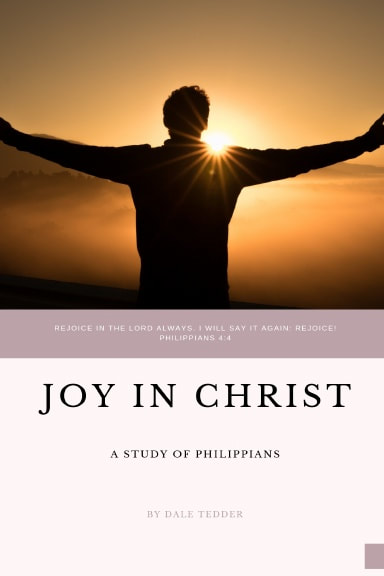|
Lesson 1
Thanksgiving and Prayer Philippians 1:1-11 1. Read Philippians 1:1-11 twice. Paul’s Letter to the Philippians is often called “The Epistle of Joy” because Paul used some form of the word “joy” around 14 times. Based on your initial reading of these 11 verses, what glimpses of Paul’s joy do you see? Now read verses 1-11 again, this time knowing Paul was in a Roman prison as he wrote this letter. How do his words now impact you? 2. Paul began his letter in the customary way for the time in which he lived. Who was Paul with and how did he describe himself and his co-worker in verse 1? Do you think it was important that he described himself in that way? Why or why not? What do you think his reason was for describing himself the way he did? 3. Who was Paul’s letter addressed to? By using the word “saints,” Paul was not describing a group of super spiritual Christians. Instead, the word “saints” describes all those who have been set apart from sin and set apart for God through Christ. In other words, it describes all Christians. Who were the other two groups he mentioned in verse 1? How did he greet them, in verse 2? 4. According to verses 3-5, why did Paul say he thanked God when he remembered them? One of the ways the church at Philippi was in partnership with Paul was financially. What other ways might a group be in “partnership in the gospel” with another person or ministry? Why is it important to be in such a partnership with other Christians and churches? What are some advantages? What message does the love and unity of church partnerships send to the watching world? 5. What did this relationship with the Philippians do for Paul’s prayer life? In this short sentence (verses 3-5), Paul beautifully described prayer. What aspects of prayer did he mention? 6. What did Paul tell the Philippians he was confident of in verse 6? Why do you think he shared this? What is the important theological truth contained in this verse? Why would it be good news to those who read it in the first century as well as those who read it today? What does this verse tell us about God? How is this verse a hopeful one for struggling Christians? What does “the day of Christ Jesus” mean? What is Paul’s point in using that phrase? 7. The Apostle’s language in verse 7 is not figurative. He actually was in prison for his gospel ministry. Paul probably had to make a case to the governing authorities for why his ministry was not a violation of the law. What does it mean for you to “defend and confirm” the gospel in today’s world? What might that look like in your life? Paul expressed how encouraged he was that the Philippians stuck by him through his imprisonment. Why would that be so meaningful to Paul? What message would that send to those outside the faith? 8. Verses 9-11 contain Paul’s prayer for the church. In the space below, outline Paul’s prayer. 9. In verse 9, Paul said he wanted their love to increasingly grow. How did he want it to grow? To our way of thinking, that may sound like an odd way to describe wanting to see someone’s love grow. Why do you think Paul wanted their love to grow in “knowledge” and “depth of insight (or “all discernment)?” Meditate on that for a moment. Based on this part of the verse, what insights can we gain about the nature of love, from a biblical perspective? 10. What does Paul want the Philippians to be able to approve of? How will knowledge and discernment enable them to do so? 11. In what ways will the wisdom to discern what is “excellent” or “best” enable the Philippians to be “pure and blameless” for the day of Christ? If we are saved by grace, why is it important to pursue purity and blamelessness? Are those characteristics even attainable? Explain what you think Paul meant here and why you think that? (List other Scripture to support your view.) 12. As Christians, we are called to become increasingly conformed to the likeness of Christ. Such “Christlikeness” will bear, among other things, the fruit of righteousness. In verse 11, Paul gives us a hint regarding how we can bear this fruit. What is the key, according to Paul? And, what is the result of this fruit of righteousness? Why does it matter? Walking Points 13. Paul is so grateful to God for the Philippians that he can’t seem to help himself; he immediately breaks into praise for them and intercedes in prayer on their behalf. Have you ever prayed this sort of prayer for someone you love and care about? What compelled you to pray in such a way? 14. Do you pray for the spiritual concerns and needs of others as much as you do their physical needs? How can using Paul’s prayer in these verses become a helpful template to serve you in your prayer life? How can his words expand your understanding of prayer? Write a personal prayer for someone you know using Paul’s outline in verses 9-11. 15. It’s important to remember Paul was in prison as he wrote this letter to the Philippians. What does that teach us about Paul’s attitude and faith? Later in the letter he will say more about how he was able to have such an attitude. But based on what you have read so far, what are three things these verses teach us about how to have Paul’s same joyful, others-centered attitude? What is one thing you can do today to begin praying like Paul? Will you do it?
0 Comments
|


 RSS Feed
RSS Feed
